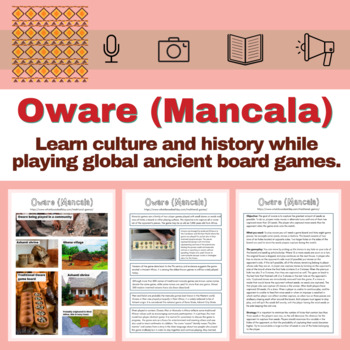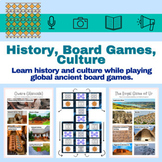Play Oware Board Game: Learn About West Africa and Board Games
- PDF
Also included in
- This is a fun resource to have on hand for lunch times, breaks, geography, social studies, and history classes! Students will be able to find instructions to make their own playing board, learn about ancient history and the history of various games, learn about different global regions of today, andPrice $7.00Original Price $9.00Save $2.00
Description
In this product, students will learn about an Ancient West African board game called Oware which falls under the Mancala umbrella of games. Mancala games are one of the oldest types of two-player turn-based strategy board games played with small pieces and rows of holes or pits in the earth and a board or other playing surface. The purpose of the game is to capture your opponent's pieces.
Students will be able to find instructions to make their own Oware playing board, learn about Ancient West African history and the history of the game, and see a slideshow of Ashante Empire monuments as seen today. For further instructions on the rules of the game, players are encouraged to look online if they need to see videos of how to play.
This resource will be great for students who love games as it is an intense, social and fun game.
When played in context, Oware, Wari or Mancala in Africa reflects some traditional African values such as encouraging community participation. It is perhaps the most social two-player abstract game. It is normal for spectators to discuss the game in progress, the game acts as a focus for entertainment and meeting others and was also used to teach arithmetic to children. The name "oware" literally means "he/she marries" and comes from a story in the Akan language about two people who played the game endlessly but in order to stay together and continue playing, they married.
Studies have shown that learning about different cultures at an early age expands our horizons, allows us to be open to criticism, as well as to be patient and willing to consider other points of view. Learning about different cultures prepares students to become better citizens in their communities, to become more empathetic, to recognize their own strengths and points of view and makes them more open to new ideas. Furthermore, students will feel more confident and safe with differences later in life which allows them to interact in a wider range of social groups and feel more confident in their interactions with others. Another benefit is that students are better prepared for a diverse workplace which is crucial in our globalized world.
Terms of Use:
Thank you for your purchase! By purchasing this resource, you are agreeing that the contents are the property of Project Lead Learning and licensed to you only for classroom / personal use as a single user. I retain the copyright, and reserve all rights to this product.
♡ Let’s Connect ♡
Follow my store (click HERE to follow me) to receive news about product launches, freebies and discounts. Each resource that I post will be at a 50% off discount for the first 24 hours so if you follow my store you will be the first to know about new product discounts.
Don't forget to leave a review because every review you leave translates into TpT credits which you can gain to buy products. When you leave a review, you'll earn 1 credit for every $1 you spent on TpT for that resource. Each credit has a value of 5 cents, so every 20 credits earned equals $1 you can apply to future TpT purchases. For example, if you provide a review on a resource priced $4.75, you'll earn 5 credits.



